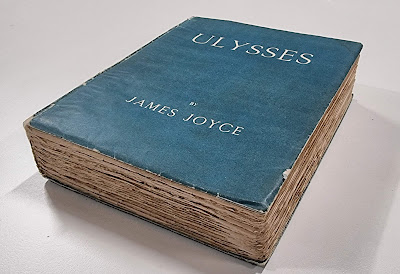Ulysses @100
 |
| First edition (1922) |
Probably no other book taught
me humility as did Ulysses by James Joyce. I read it in my late 20s just
because it was one of the most discussed works of literature among literary
intellectuals and geniuses in those days. I can’t even say that I read it
though I did reach the last chapter which nearly drove me crazy. I can say with
much confidence that I understood very little of the novel then. I never laid my
hands on it again. I didn’t dare to.
The book has
completed a century of its existence now. It was originally published in 1918
as a serialised work in the Little Review, but appeared as a book first in
Feb 1922. The serial had already created quite a furore and hence the book was
published from Paris. Copies of the first English edition were burned by the
New York post office authorities while the second edition copies were seized by
the Folkestone Customs authorities. It took ten years for United States
District Court to decide that the novel was not obscene as alleged by the custodians
of public morality.
I remember
laughing occasionally while reading the book. There is much humour in it and
some of it is blatantly blasphemous. [Example: Jesus stands before Lazarus’s
tomb and orders, “Come forth, Lazarus.” Lazarus comes fifth and loses the job.]
I don’t remember stumbling on obscenity, however. Probably I didn’t understand
it so much. Or my standards of obscenity differed from most other people’s. It
was both, I think now.
The massive
novel (about 700 pages or so) tells the story of one day in Dublin, 16 June 1904,
now known as Bloomsday. One day and 700 pages! Amazing. I dared to write a
novel in the autumn of my life and its plot spans over a century and is over in
some 140 pages. That’s one of the differences between a genius and a dunce, I
guess: the genius spills over 700 pages in a day. I do have reasons to feel
humble.
Of course,
Ulysses is a lot more than pages. It has all the diverse colours of life with
all its vitality. It tells the story of Leopold Bloom, an unsuccessful
advertisement canvasser, Stephen Dedalus, would-be artist whom I met in The
Portrait of the Artist as a Young Man in my post-graduate course in
literature, and Molly Bloom. Leopold is both a hero and an antihero. Life in Ulysses,
as anywhere else, is both significant and insignificant. It can be at once
trivial and heroic. The familiar can become exotic and vice versa depending how
you look at it. Joyce’s Ulysses is the entire human universe, in other
words.
That’s what I
learnt in my literature classes. But I never dared to touch that universe a
second time. Will I dare now as the book marches majestically into the second
century of its existence? I doubt.
Hari OM
ReplyDeleteInterestingly, I have seen this book classified as Grade 8 (US), young adult fiction! Certainly, it was presented to us in my final year at school as one of those 'must reads' if one had any literary pretentions. I do believe there are a considerable number of literary types in the world who have NOT read Ulysses... even if they claim to have done so! All I could think about when reading it was 'what a waste of proper reading time'!!! That said, I did have a gander just now and came across THIS VIDEO, which does actually give one hope of there being some worth in trying again. Mind you the fact that there are books and videos available to explain HOW to read another book begs the question - is it worth my time? YAM xx
You hit the nail on the head. If we spend months on a book like this we may find the reading rewarding. But is it worth the time and effort?
DeleteI also feel that quite many people who claim to have read it may be meaning that they tried to read it.